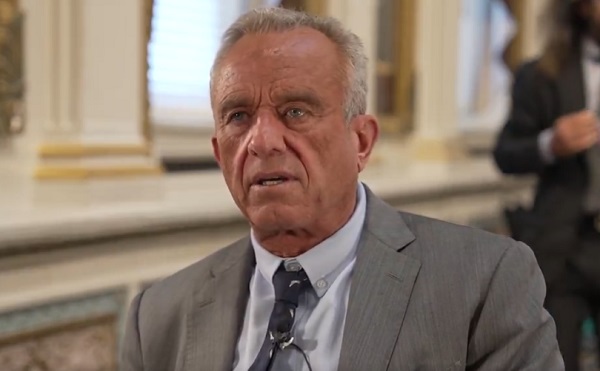Health
Radio-Canada journalist defends report exposing ‘gender clinics’ for ‘transitioning’ children

From LifeSiteNews
Radio-Canada journalist Pasquale Turbide revealed that concerns from parents were what originally sparked her investigative report on the gender ‘transitioning’ of children in Quebec.
A Radio-Canada journalist is defending her investigative report that exposed a “gender” clinic in Quebec for prescribing potentially sterilizing hormones to an actress posing as a young teen in less than ten minutes.
In a March 3 interview on Tout le Monde en Parle, Radio-Canada journalist Pasquale Turbide revealed that concerns from parents were what originally sparked her investigative report on the gender “transitioning” of children, and that she stands by her work despite backlash.
“Parents began writing to us last summer, when there was a bit of a controversy about names, pronouns, all-gender bathrooms, etc,” said Turbide in French.
“But the letters we were getting were not about those issues, they were talking about medical transitions,” she explained.
According to Turbide, the parents who contacted Radio-Canada revealed that their children, who believed they were “transgender,” were being offered sterilizing “puberty blockers” in the name of care.
“We started to look into it, and we easily found fifteen to twenty people who were all telling us more or less the same story,” said Turbide. “They were often very open-minded parents, open to homosexuality, open to all sorts of things but were panicking at the speed of the transgender healthcare system.”
The documentary, published by Radio-Canada, the French arm of the state-funded Canadian Broadcasting Corporation (CBC), delved into the dangers of giving children “puberty blockers” as well as the regrets of detransitioners, the term for people who have undergone irreversible surgeries in an attempt to “change” their gender but now regret it.
The report also followed an actress posing as a 14-year-old patient at a private “gender clinic” in Quebec where she was prescribed testosterone and advised on life-altering mutilating surgeries during a consultation that lasted a meagre nine minutes.
During her interview, Turbide exposed the dangers of taking puberty blockers, especially considering many of the side effects are still unknown.
“We’re beginning to realize that they may have an impact on brain development,” she stated.
“Girls take testosterone, boys take estrogen and that’s semi-irreversible,” Turbide added. “Some things don’t come back even if they stop. One’s voice will stay changed most of the time. The face of their shape is another thing that’s affected. You can become infertile if you are a girl. It’s not yet clear how far it can go.”
Turbide further pointed out that some Scandinavian countries are seeking to ban the irreversible treatments for children.
The documentary went viral online the same week leaked internal communications show doctors who offer so-called “gender-affirming care” know that transgender hormones cause serious diseases, including cancer.
Journalist Michael Shellenberger released the internal documents from the World Professional Association for Transgender Health (WPATH), which “is considered the leading global authority” on so-called “gender medicine,” despite being an LGBT activist group.
The “WPATH FILES” include emails and messages from an internal discussion forum by doctors, as well as statements from a video call of WPATH members. The files reveal that the doctors working for WPATH know that so-called “gender-affirming care” can cause severe mental and physical disease and that it is impossible for minors to give “informed consent” to it.
As LifeSiteNews has previously noted, research does not support the assertions from transgender activists that surgical or pharmaceutical intervention to “affirm” confusion is “necessary medical care” or that it is helpful in preventing the suicides of gender-confused individuals.
In fact, in addition to asserting a false reality that one’s sex can be changed, transgender surgeries and drugs have been linked to permanent physical and psychological damage, including cardiovascular diseases, loss of bone density, cancer, strokes and blood clots, infertility, and suicidality.
There is also overwhelming evidence that those who undergo “gender transitioning” are more likely to commit suicide than those who are not given irreversible surgery. A Swedish study found that those who underwent “gender reassignment” surgery ended up with a 19.2 times greater risk of suicide.
Indeed, there is proof that the most loving and helpful approach to people who think they are a different sex is not to validate them in their confusion but to show them the truth.
A new study on the side effects of transgender “sex change” surgeries discovered that 81 percent of those who had undergone “sex change” surgeries in the past five years reported experiencing pain simply from normal movement in the weeks and months that followed — and that many other side effects manifest as well.
Additionally, LifeSiteNews compiled a list of medical professions and experts who warn against transgender surgeries, warning of irreversible changes and lifelong side effects.
Addictions
There’s No Such Thing as a “Safer Supply” of Drugs

By Adam Zivo
Sweden, the U.K., and Canada all experimented with providing opioids to addicts. The results were disastrous.
[This article was originally published in City Journal, a public policy magazine and website published by the Manhattan Institute for Policy Research. We encourage our readers to subscribe to them for high-quality analysis on urban issues]
Last August, Denver’s city council passed a proclamation endorsing radical “harm reduction” strategies to address the drug crisis. Among these was “safer supply,” the idea that the government should give drug users their drug of choice, for free. Safer supply is a popular idea among drug-reform activists. But other countries have already tested this experiment and seen disastrous results, including more addiction, crime, and overdose deaths. It would be foolish to follow their example.
The safer-supply movement maintains that drug-related overdoses, infections, and deaths are driven by the unpredictability of the black market, where drugs are inconsistently dosed and often adulterated with other toxic substances. With ultra-potent opioids like fentanyl, even minor dosing errors can prove fatal. Drug contaminants, which dealers use to provide a stronger high at a lower cost, can be just as deadly and potentially disfiguring.
Because of this, harm-reduction activists sometimes argue that governments should provide a free supply of unadulterated, “safe” drugs to get users to abandon the dangerous street supply. Or they say that such drugs should be sold in a controlled manner, like alcohol or cannabis—an endorsement of partial or total drug legalization.
But “safe” is a relative term: the drugs championed by these activists include pharmaceutical-grade fentanyl, hydromorphone (an opioid as potent as heroin), and prescription meth. Though less risky than their illicit alternatives, these drugs are still profoundly dangerous.
The theory behind safer supply is not entirely unreasonable, but in every country that has tried it, implementation has led to increased suffering and addiction. In Europe, only Sweden and the U.K. have tested safer supply, both in the 1960s. The Swedish model gave more than 100 addicts nearly unlimited access through their doctors to prescriptions for morphine and amphetamines, with no expectations of supervised consumption. Recipients mostly sold their free drugs on the black market, often through a network of “satellite patients” (addicts who purchased prescribed drugs). This led to an explosion of addiction and public disorder.
Most doctors quickly abandoned the experiment, and it was shut down after just two years and several high-profile overdose deaths, including that of a 17-year-old girl. Media coverage portrayed safer supply as a generational medical scandal and noted that the British, after experiencing similar problems, also abandoned their experiment.
While the U.S. has never formally adopted a safer-supply policy, it experienced something functionally similar during the OxyContin crisis of the 2000s. At the time, access to the powerful opioid was virtually unrestricted in many parts of North America. Addicts turned to pharmacies for an easy fix and often sold or traded their extra pills for a quick buck. Unscrupulous “pill mills” handed out prescriptions like candy, flooding communities with OxyContin and similar narcotics. The result was a devastating opioid epidemic—one that rages to this day, at a cumulative cost of hundreds of thousands of American lives. Canada was similarly affected.
The OxyContin crisis explains why many experienced addiction experts were aghast when Canada greatly expanded access to safer supply in 2020, following a four-year pilot project. They worried that the mistakes of the recent past were being made all over again, and that the recently vanquished pill mills had returned under the cloak of “harm reduction.”
Subscribe for free to get BTN’s latest news and analysis – or donate to our investigative journalism fund.
Most Canadian safer-supply prescribers dispense large quantities of hydromorphone with little to no supervised consumption. Patients can receive up to 40 eight-milligram pills per day—despite the fact that just two or three are enough to cause an overdose in someone without opioid tolerance. Some prescribers also provide supplementary fentanyl, oxycodone, or stimulants.
Unfortunately, many safer-supply patients sell or trade a significant portion of these drugs—primarily hydromorphone—in order to purchase more potent illicit substances, such as street fentanyl.
The problems with safer supply entered Canada’s consciousness in mid-2023, through an investigative report I wrote for the National Post. I interviewed 14 addiction physicians from across the country, who testified that safer-supply diversion is ubiquitous; that the street price of hydromorphone collapsed by up to 95 percent in communities where safer supply is available; that youth are consuming and becoming addicted to diverted safer-supply drugs; and that organized crime traffics these drugs.
Facing pushback, I interviewed former drug users, who estimated that roughly 80 percent of the safer-supply drugs flowing through their social circles was getting diverted. I documented dozens of examples of safer-supply trafficking online, representing tens of thousands of pills. I spoke with youth who had developed addictions from diverted safer supply and adults who had purchased thousands of such pills.
After months of public queries, the police department of London, Ontario—where safer supply was first piloted—revealed last summer that annual hydromorphone seizures rose over 3,000 percent between 2019 and 2023. The department later held a press conference warning that gangs clearly traffic safer supply. The police departments of two nearby midsize cities also saw their post-2019 hydromorphone seizures increase more than 1,000 percent.
The Canadian government quietly dropped its support for safer supply last year, cutting funding for many of its pilot programs. The province of British Columbia (the nexus of the harm-reduction movement) finally pulled back support last month, after a leaked presentation confirmed that safer-supply drugs are getting sold internationally and that the government is investigating 60 pharmacies for paying kickbacks to safer-supply patients. For now, all safer-supply drugs dispensed within the province must be consumed under supervision.
Harm-reduction activists have insisted that no hard evidence exists of widespread diversion of safer-supply drugs, but this is only because they refuse to study the issue. Most “studies” supporting safer supply are produced by ideologically driven activist-scholars, who tend to interview a small number of program enrollees. These activists also reject attempts to track diversion as “stigmatizing.”
The experiences of Sweden, the United Kingdom, and Canada offer a clear warning: safer supply is a reliably harmful policy. The outcomes speak for themselves—rising addiction, diversion, and little evidence of long-term benefit.
As the debate unfolds in the United States, policymakers would do well to learn from these failures. Americans should not be made to endure the consequences of a policy already discredited abroad simply because progressive leaders choose to ignore the record. The question now is whether we will repeat others’ mistakes—or chart a more responsible course.
Our content is always free –
but if you want to help us commission more high-quality journalism,
consider getting a voluntary paid subscription.
Health
RFK Jr. says ‘everything is going to change’ with CDC vaccine policy in Michael Knowles interview

From LifeSiteNews
New Health and Human Services Director Robert F. Kennedy Jr. said the CDC’s own reporting system ‘captures fewer than 1% of vaccine injuries. It’s worthless, and everybody agrees it’s worthless.’
When Michael Knowles asked new Health and Human Services (HHS) Secretary Robert F. Kennedy Jr. if anything will change regarding the public’s justifiable concern with the growth of vaccines, Kennedy quickly shot back, “Everything is going to change.”
Kennedy pointed to the Centers for Disease Control’s current flawed VAERS (Vaccine Adverse Event Reporting System) online mechanism.
By way of example, he said, “None of the vaccines that are given during the first six months of life have ever been tested for autism. The only one was the DTP vaccine. And that one study that was done, according to the Institute of Medicine, the National Academy of Sciences, found that there was a link.”
But “They threw out that study because it was based upon CDC’s surveillance system, VAERS, and they said that system is no good.”
“That begs the question, why doesn’t CDC have a functional surveillance system?” he asked. “We’re gonna make sure they do.”
“They don’t do pre-licensing safety testing for vaccines” he continued. “They’re the only product that’s exempt. So what they say is, if there are injuries, we’ll capture them afterward.”
However, “they have a system that doesn’t capture them. In fact, CDC’s own study of its own system said it captures fewer than 1% of vaccine injuries,” Kennedy said. “It’s worthless, and everybody agrees it’s worthless.”
“Why have we gone for 39 years and nobody’s fixed it?” he wondered, promising, “We’re gonna fix it.”
“We have DOGE (which) knows how to manage data. We’re going to be able to get into these databases and give answers to the American public,” Kennedy predicted.
“We’re going to have gold standard science, we’re going to follow the science, we’re going to publish all of our datasets, which CDC has never done,” he said.
“We’re going to do replication of all of our studies, which CDC has never done. We’re going to publish our peer review, which CDC has never done,” Kennedy vowed. “So people are going to have real answers for the first time.”
The new HHS head also discussed more broadly his mission after taking over the department’s helm, the mess created by the Biden administration, his job’s challenges, and recent developments thanks to DOGE.
“HHS is a $1.9 trillion agency. It’s the biggest agency in the government. And during the Biden administration, President Biden increased its budget by 38% and increased the workforce by 17%.”
“And by every metric by which we measure public health, health accelerated its decline.”
“When I came to HHS, what I found was a sprawling bureaucracy,” with functional duplication of departments, rampant redundancy and overstaffing, with various sub-agencies often acting in a territorial, self-protecting manner rather than a synergistic one.
“Perverse incentives” sometimes drive employee’s work,” he noted.
Despite his short tenure at HHS, with the help of DOGE, Kennedy has already released 20,000 “bureaucrats” from the department’s ranks.
“We’re going from 82,000 personnel to 62,000,” said Kennedy, carefully pointing out, “We’re keeping the scientists and frontline providers.”
Kennedy said that it has been really hard to fight against the problems at HHS and NIH over the last 40 years from “the outside.”
But “now I’m on the inside,” he declared. “This is the purpose of my life. It’s what I’m going to do over the next four years.”
He concluded:
President Trump promised to return the American dream to Americans.
A healthy person has a thousand dreams. A sick person only has one.
-

 Uncategorized1 day ago
Uncategorized1 day agoPoilievre on 2025 Election Interference – Carney sill hasn’t fired Liberal MP in Chinese election interference scandal
-

 Business2 days ago
Business2 days agoCuba has lost 24% of it’s population to emigration in the last 4 years
-

 2025 Federal Election1 day ago
2025 Federal Election1 day ago2025 Election Interference – CCP Bounty on Conservative Candidate – Carney Says Nothing
-

 2025 Federal Election1 day ago
2025 Federal Election1 day ago2025 Federal Election Interference from China! Carney Pressed to Remove Liberal MP Over CCP Bounty Remark
-

 2025 Federal Election16 hours ago
2025 Federal Election16 hours agoChinese Election Interference – NDP reaction to bounty on Conservative candidate
-

 2025 Federal Election6 hours ago
2025 Federal Election6 hours agoChina Election Interference – Parties Received Security Briefing Days Ago as SITE Monitors Threats to Conservative Candidate Joe Tay
-

 Aristotle Foundation2 days ago
Aristotle Foundation2 days agoCanada has the world’s MOST relaxed gender policy for minors
-

 International2 days ago
International2 days agoTrump signs executive order to make Washington D.C. “safe and beautiful”






